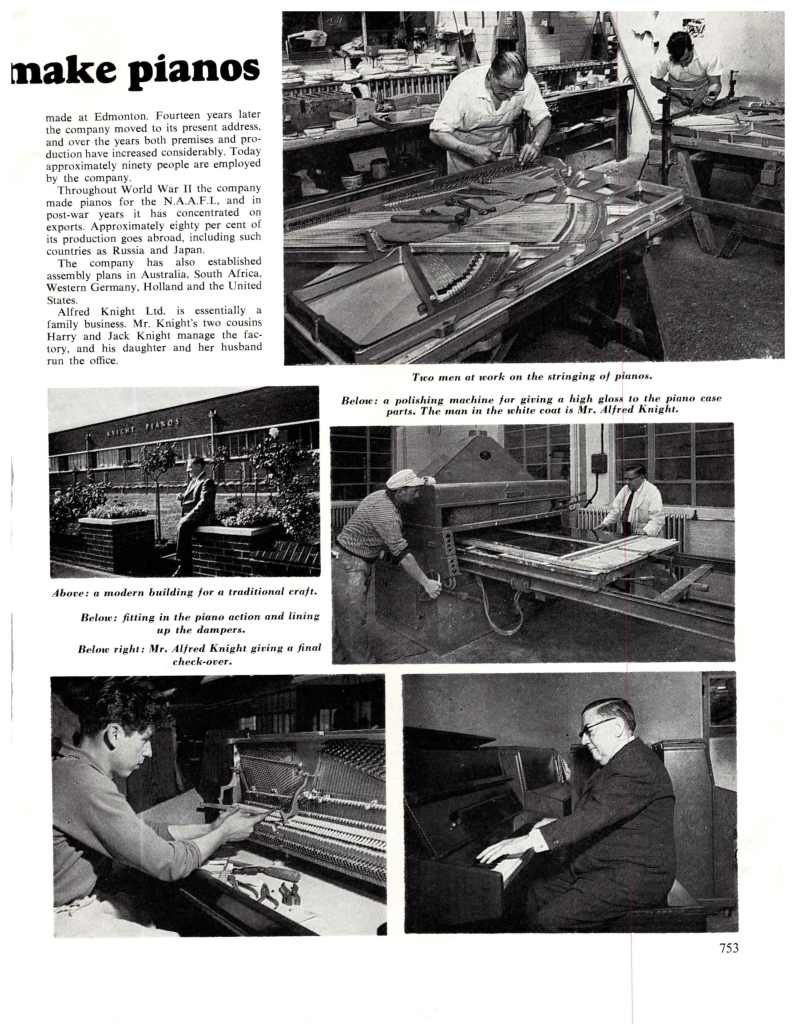The Knight Piano Company was founded by Alfred Knight in 1936 in the United Kingdom. A few baby grand pianos were built by the Knight Company however most were upright pianos which were mostly 100 - 110cms in height. The Knight name and design were acquired by Whelpdale, Maxwell and Codd Ltd, the makers of the Welmar piano and this company built a few Knight pianos before the company closed in 2003.
The following is form the Sheffield Evening Telegraph 22nd November 1939. THE KNIGHT PIANO has proved one of the most popular pianos ever offered to the public, and the reasons are not far to seek. MODERN IN DESIGN. FLAWLESS WORKMANSHIP. TONE OF EXCEPTIONAL QUALITY. Amongst important features are the full deep bass and brilliant treble, with wonderful sustaining powers. These, allied with the Easy Touch Repetition Action, make the Knight Plano the ideal instrument for the Musician or Student. FULLY GUARANTEED. The Knight Plano will give lifetime’s ■ rvlce, and guaranteed for 20 years Prices are moderate, FROM 49 GNS. OR CONVENIENT TERMS ARRANGED. We invite visit inspection, full details will be posted on request. CRANE & SONS, Ltd., Famous for “Quality” Pianos since 1850. 4. 5 6. LADY'S BRIDGE. SHEFFIELD, 5.
From Evening Post November 28th 1989.
The Knight pianos are considered to be a good upright piano with a rich warm tone and a refined firm touch. Knight pianos have a light European spruce soundboard and because this is a close-grained wood it has a more resonant character in comparison with any other timber. This is why the Knight piano has such a sensitive response.
From The Evening Chronicle Thursday 1st September 1988.
Many instruments were bought for schools and colleges in the UK and other parts of the Commonwealth. Knight pianos were the only brand that were able to share the showroom at Steinway Hall, London. Alfred Knight wanted to export the pianos made in his company to the United States. A new model was introduced in the 1950s, the K15 which had a spinet case, a style that was popular in the United States at the time. It was only a metre tall.
From Liverpool Daily Post 4th April 1941.
Alfred Knight had several patents to his name and he was highly regarded as a piano maker.
From Birmingham Post Monday 2nd May 1955.
PLANE-BUILDING TECHNIQUE ADAPTED TO MOST PIANO EXPORTS IDEAS used in making British fighter planes during the war are now helping one of Britain's biggest peace-time boom industries the manufacture of high-quality pianos. One of the most difficult problems before the war when British exports were very small, was to make pianos that would stand up to heat and humidity in climates ranging from the African jungle to the near-Arctic. The Temple Pianoforte Co. of Newington Green, London, N. 16. has overcome this difficulty recently. Mr Evans is chairman of the 150-year-old firm of Chas. H. Challen and Son Ltd, of Finsbury Park, London, N. 4; he has served with British Industries Fair committees for more than 20 years. Among the improvements which have enabled British firms to enter new markets are synthetic resins in place of animal glues, specially made keys and hammers and attractively designed casework. Some firms specialise in pianos for countries whose weather problems they have studied specially. W. G. Eavestaff and Sons. Ltd.. of Harringay, London, N. 4, for instance, has built three of the latest type of kilns and a dry timber store so that they could guarantee pianose sent to Scandinavia and Canada where in winter there is central heating in most of the houses and freezing weather outside. ADAPTABILITY A T times pulley-blocks have to be used for purposes alien to industrial uses. The Loughborough firm of Herbert Morris Ltd., which is exhibiting in the engineering section at Castle Bromwich, supplied pulley-blocks to an explorer in Central Africa for hitching on to a tree and pulling out his car when it became bogged. With similar equipment a special portable jib crane was transported over the Andes. Many executives have travelled thousands of miles to find out the climatic problems of individual countries. Mr. Alfred E. Knight, managing director of Alfred Knight Ltd., of Edmonton. London, which sends instruments to 54 countries, is often consulted by manufacturers during his trips throughout the world. by modifying the methods used in building Mosquito and Vampire fuselages and gliders. The result is a revolutionary piano soundboard which is composed of laminated and pre-formed veneers like the laminated skins used in the fuselage construction.
Below is from Grace’s Guide to British Industrial Industry.
1898 Alfred Edward Knight, piano manufacturer, was born at 99 Camberwell Road, south London, on 26 December, the son of Alfred Edward Knight, journeyman piano maker, and his wife, Florence Jane.
His family had been involved with piano making for the previous four generations, his great-great-grandfather having worked in the Broadwood workshop when it was at Westminster.
Knight attended the West Square Central Boys' School, Southwark, where he showed a talent for wood- and metalwork. He spent part of his spare time, while at school, helping in the factory of the Hicks company in the New Kent Road.
1913 He entered an apprenticeship with Hicks, at the age of fourteen.
By 1919, having successfully completed his training, he had started to work for the piano manufacturers Squire and Longson of Medlar Street, Camberwell.
In 1923 he married Florence Jenny, daughter of Alfred George Slodden, a machinist; they had two daughters and possibly other children.
British piano makers were confronted by turbulent industrial relations, changing economic circumstances, and in some cases, weaknesses in management, which led, for example, to the collapse of the Brinsmead firm in 1920. Nevertheless, Squire and Longson survived the period, making good quality instruments under the brand name of Cremona, and also under the name Welmar for Whelpdale, Maxwell and Codd until 1929, when their premises were destroyed by fire — a fate suffered so often by instrument makers. The factory was rebuilt.
1931 Knight left to set up a new business, Booker and Knight, at a factory in Carysfort Road, Stoke Newington. This bold step in the most severe years of the depression was rewarded with success.
By 1935 Knight was able to buy out Booker and set up his own Knight Piano Co.
Alfie, as he was known, was ‘a bustling cheerful Londoner, with a brisk line in chat, a consummate salesman, as well as a fine craftsman. He was gregarious and loved meeting people’. Among the honours bestowed on Knight were the freedom and honorary citizenship of the city of Santiago, as well as a knighthood of the honorable order of Kentucky colonels.
1955 The Knight Piano Company moved to a new factory at Loughton in Essex, and there the firm concentrated on a range of standard upright models.
1966 Knight was appointed OBE for his services to music and to musical education. In both areas he was an active participant, having been president of the Association of Blind Piano Tuners, a competent pianist, and a devoted educator. He toured schools, lecturing and expounding the philosophy that: Music is something you can do and appreciate for the whole of a lifetime... When parents give their children a musical education they are giving them the greatest gift possible. The playing of a musical instrument and appreciation of music is about the only thing left that can be done from nine to ninety.
Knight is noted chiefly for his innovation in the use of plastics in place of wood in piano construction, and it is significant that in a number of reference books on the piano, it is almost only in this connection that he is mentioned. By personal research he developed a nylon impregnated with glass fibre and graphite as the main material which could give stability in a wide range of hostile environments. His lead in the development of piano actions was significant, and the world dominance of actions by Herrburger, Brooks and other American firms was successfully challenged by the setting up of British Piano Actions at Llanelli in south Wales, a company of which Knight was a director.
1974 Knight died at his home, 26 Wellfields, Loughton, Essex, on 3 September. Sylvia Florence - Alfred's daughter - married John York, a director of Alfred Knight Ltd, and succeeded to the chairmanship of the company on her father's death. They had two children together, Gillian and Michael. Gillian worked for the company until her marriage, and after taking charge of the technical side of the firm, their son, Michael, became the company's general manager.
It was mentioned on one website that Alfred Knight’s great great grandfather worked for John Broadwood and Sons Piano Company. One of his grandfathers was a pianoforte maker and his father was a piano regulator.
In the 1861 Census Charles Knight, Alfred Edward Knight’s grandfather (who founds Knight Piano Company) is an apprentice piano maker and his father is William Knight , a tailor, who was born in Devonport Devon. Charles Knight is a pianoforte maker in the 1871 Census. The 1881 Census shows Charles Knight working as a piano finisher. Charles Knight is a widower in the 1891 Census and his son, Alfred Knight is 16, Alfred Knight’s father. At this time the family is living in Islington and Charles Knight is a pianoforte regulator. The 1901 Census shows Charles Knight living in Dalston, working as a piano regulator and is an employer. In the 1911 Census Charles Knight, is working as a piano regulator but not as an employer. He is living with his second wife, his son with Harriet his second wife and although the other children have the Knight surname they are actually his step-children, the children from his wife’s prior marriage.
Alfred Knight’s father married on Christmas Day 1897 to Florence Jane Liversage at St Paul’s Newington. London. Their son, Alfred Knight was born on Boxing Day 1898. In the 1901 Census Edward Knight senior is shown as a regulator contractor pianoforte maker and their son, Alfred Edward was born in Camberwell. The following Census in 1911 shows Alfred Knight senior working as a piano regulator and his son Alfred Knight at school. By the 1921 Census both father and son are working for Squire and Longson as piano finishers although it states that both are ‘out of work’.
The following is from Findmypast. This is the closest definition we could find in the Ministry of Labour’s 1921 dictionary:
Finisher (pianos), piano finisher; (i) receives action parts in bundles, and assembles them into complete actions, as for action assembler (042);~(ii) receives actions ready assembled; screws assembled action into piano case over keys, chiseling, filing and otherwise trimming piano frame and/or action beam to make action fit exactly into frame; sees that proper contact is made between action and keys; cuts hammer shanks, if necessary, to correct length, with a small hand saw, and glues hammers into action; adjusts setting of action parts roughly and approximately to frame, by unscrewing wooden screw heads, called buttons, which are part of connecting and adjusting mechanism; prepares piano for final process of adjustment, close to a regulator; is sometimes known as action finisher, but must be distinguished from action finisher.
In the 1939 Register Alfred Knight and his family are living at 10 Clapton Common and he is a piano manufacturer. Alfred Knight and his wife could have had three daughters, and two of them could have been twins.
From personal ephemera collection.
References
www.ancestry.com
www.en.wikipedia.org.wiki/Knight_Pianos
www.robertspianos.com
www.sheargoldmusic.co.uk/knight-pianos
www.pianotuners.org/knight























